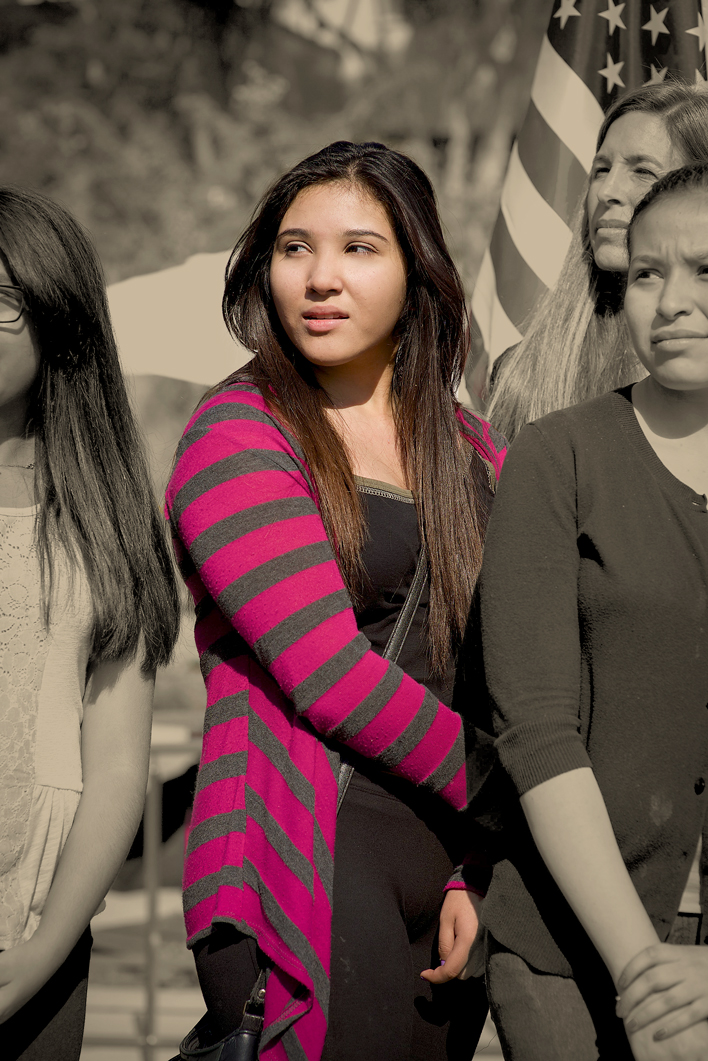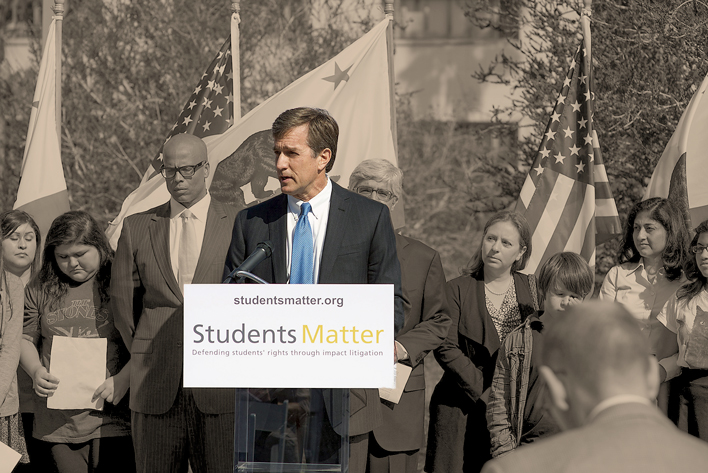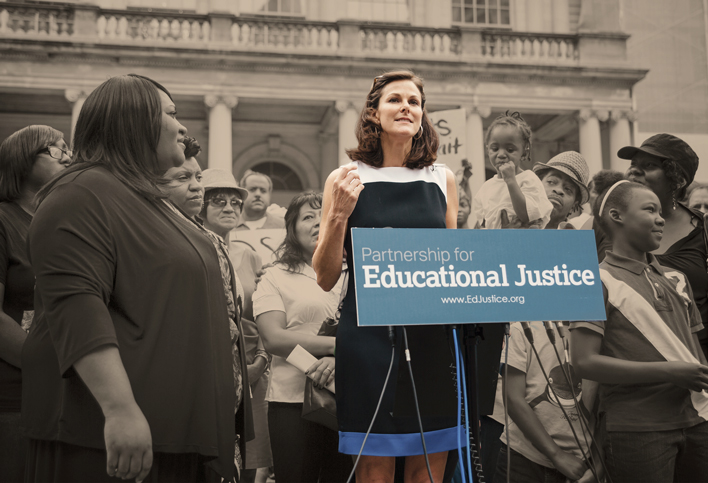As a sophomore at Cesar Chavez Learning Center in Los Angeles, Beatriz Vergara had a captivating history teacher last year. This teacher nurtured in her a love of the subject, instructing with enthusiasm and drama while fostering an encouraging class environment. Beatriz now finds history interesting and, daresay, fun.
But Beatriz didn’t always like going to class. She used to have a history teacher who let students smoke marijuana in the back of the room, spent the majority of instruction time on his laptop, and hinted the Latino stu- dents would grow up to “clean houses for a living.” In a middle-school science class, she never asked questions because she was afraid of her teacher, who at times called female stu- dents by rude nicknames.
With an ambition to become a nurse, Beatriz realized she was falling behind. “It made me feel bad about myself,” she said in sworn testimony for the California Superior Court for the County of Los Angeles, “but it also made me work harder” to defy their expectations.
“A teacher is supposed to encourage you and motivate you and not put you down,” she continued. “If you have a bad teacher you’re not going to want to go to school, you’re going to probably drop out.” Speaking of her siblings, she said, “I want them to have a better future. I want them to stay in school. I want them to have teachers that actually care for them so they can get somewhere.”
Determined to get somewhere, Beatriz and eight other students filed a civil lawsuit, Vergara v. State of California, with the help of a new organization called Students Matter established specifically to improve schools through targeted litigation. Founded by Silicon Valley entrepreneur David Welch, Students Matter recruited A-team law firm Gibson, Dunn & Crutcher and media company RALLY to organize a case against California’s sclerotic tenure rules— which make it almost impossible to dismiss even the most terrible teachers. Prohibitions against firings, rules demanding that teachers be laid off solely by seniority without any reference to the quality of their performance, and other contract provisions that effectively give teachers permanent employment disproportionately harm low-income and minority students, argued the resulting suit, and directly violate California’s constitutional guarantee of equal access to education.
In a trial lasting two months, the court heard from L.A. Superintendent John Deasy, Harvard economist Raj Chetty, teachers, student plaintiffs, and countless educa- tion experts on both sides. A media campaign outside the courtroom raised the profile of the cause.
This June, the court ruled decisively in favor of the plaintiffs: There is “no dispute that there are a significant number of grossly ineffective teachers currently active in California classrooms,” wrote Judge Rolf Treu. “All sides to this litigation agree that competent teachers are a critical, if not the most important, component of suc- cess of a child’s in-school education experience. All sides also agree that grossly ineffective teachers substantially undermine the ability of that child to succeed in school,” he went on. “The evidence is compelling. Indeed, it shocks the conscience…. All Challenged Statutes are found unconstitutional.”
California was one of the earliest states to pass a teacher-tenure law, back in 1921, and legislative attempts to reform tenure have always been batted down by the teacher unions.Two efforts in the legislature by Governor Arnold Schwarzenegger were defeated, and Governor Pete Wilson failed in three previous tries. Schwarzeneg- ger even crafted a ballot initiative and called a special election to vote on it, but it lost by a 55 to 45 percent vote in 2005. It is estimated that the California Teachers Association spent at least $50 million to defeat the initiative, raising annual teacher member fees by $60 for this special purpose.
Nine years later, one donor and nine students took up the same cause—and won.
Conviction that sustains
David Welch grew up in Severna Park, Maryland, where he and his six siblings attended a large public school. “I had a number of exceptional teachers. I’m a very science- and engineering-centric guy so I remember my science teachers with a lot of fond memories of their passion and drive,” he says. After high school he earned a B.S. from the University of Delaware and a Ph.D. in electrical engineering from Cornell.
In California he co-founded a manufacturer of optical telecommunications equipment called Infinera in 2001, and he now holds more than 130 patents in optical-transmission technologies. From TV to phones to the Internet, “everything comes along a fiber-optic cable,” Welch explains. “And we make the equipment that plugs into that fiber-optic cable to send the bits around the world.”
The brokenness of American public education had troubled Welch for a long time. “Education is one of the key pillars of our society, and ultimately it’s the gift you need to give to both your children and everyone’s children,” he says. In 2001 he and his wife, Heidi, dipped their toes into ed reform by looking at how they could support the public-school system through new teaching models and technology in the classroom. In the process he came to realize that the public system “was doing a disservice to huge tracts of children everywhere, but predominantly children at risk or in large urban areas.”

Beatriz Vergara believed she was being held back by incompetent teachers. She filed suit. (Students Matter)
After a decade of working within the system with no discernible results, Welch says, “we felt the only path forward was to use litigation as a mechanism to have a fact-based, non-rhetoric conversation about whether the educational system is really serving children.” After founding Students Matter in 2011, he began by gathering facts. Talking to superintendents, teachers, charter-school operators, and other educators and reformers, one point that was driven home time and again was the importance of teacher quality. And the tragic reality was that “often you’re unable to do anything about it, because the laws and the policies that have been adopted in California as well as in other states inhibit the ability to ensure high-quality teaching.”
After having dinner with the student plaintiffs in their homes and learning about their experiences, he was confident that they would win in court. “I always believed we were right,” he says. “My lawyers laugh at me when I say that, and obviously I understood that there was risk to it. But I believe our education system is built for the purpose of serving our children, and the laws we addressed run completely counter to giving the best education possible.” He takes the ruling as rec- ognition that “these laws do infringe on the rights of children, and there’s no reason why they need to. I was also pleasantly surprised that national public sentiment reinforced our beliefs.”
The fight is far from over for Students Matter. Governor Jerry Brown has already filed an appeal of the ruling, which could take as long as three years to work its way through the California legal system. Welch cautions other donors interested in impact litigation that “it’s a process that takes time. You’ll have to sustain your conviction on what’s right and stay with that. It’s not something you’re going to solve in a month or even in a year. But when you get a court that reaffirms basic beliefs, you can make a tremendously long-term impact on society.”
Media matters
Felix Schein, president of RALLY, is a former producer and reporter at “Meet the Press,” “NBC Nightly News,” and other shows. He welcomed the opportunity to work on the Vergara case because “in the traditional political debate there is a lot of back and forth about the status quo…. What we miss is the question of what ought to be, and what is right.” RALLY put out press releases and fact sheets, developed rapid-response messaging to answer attacks, arranged media opportunities for its experts, and made heavy use of social media. The case ended up being widely covered by national news outlets.
Students Matter made a substantial investment in research, to be used both by the lawyers and by the media campaigners. “In the court of law facts are ultimately what matters and prevails,” says Schein. “We spent a lot of time trying to find folks who could provide research and data and evidence in the trial. And we went to great lengths to share that.”
Lining up representatives from the education establishment to speak in support of Vergara was one important task. Among those to come forward were the Oakland Alliance of Black Educators, U.S. Secretary of Education Arne Duncan, Sacramento Mayor Kevin Johnson, former school superintendents in Sacramento City and Oakland, and sitting Los Angeles superinten- dent John Deasy, who, in a strange twist, was a vocal supporter of the plaintiffs even while his district was originally named as a defendant in the case (although dismissed before the trial).
In the first two years of the case, Students Matter spent $3 million on legal fees, the media campaign, research, and community outreach. Welch provided most of these funds, with additional contributions from Eli Broad, the Walton Family Foundation, and a few other donors.
Representatives from the two major California teacher unions, co-defendants in the case, argued that Students Matter was warping the political process with personal money. Schein counters that “it’s often true that new and untested approaches hinge on a seed funder. Solutions to these hard problems don’t just happen, someone has to get in its face and decide to do something innovative.” This “doesn’t attract traditional funders.”
What stood out about Welch, Schein says, “was that he was willing to take a risk on something that was untried…. He embodies the ethos of Silicon Valley, which is to look at things from different angles…. If you’re finding that one path isn’t the right path, you’re always willing to explore additional paths. In that way we were quite nimble.”
Their campaign’s goal was even broader than win- ning the lawsuit; it was to change the public debate about education reform. Schein says they were aiming to “bring attention to an issue that has had little traction in the legislature over the last three decades. Now that we have seen the facts in a court of law, and heard about the outrage of a system that is failing our kids, momen- tum is growing in California and elsewhere to build a common-sense system.”
In this sense, Welch’s team already considers its work a success even with the legal appeal pending. Compared to two years ago when the case was filed, “today we are in a different world” in terms of public awareness, Schein says. Welch is pleased to see that “the impact has clearly already been national.”
The next step in California is preparing for the appeal, and advocating new laws for the legislature to consider. Meanwhile, RALLY and Students Matter have already teamed up for a new case on the opposite coast: Davids v. State of New York, in which eight stu- dents are suing for relief from teacher-tenure and other public-school employment rules that limit their right to a quality education.
“In Vergara our goal has been to create a model that others can replicate or innovate on,” says Schein. “Litigation has long had a role in shaping and influencing public policy, it’s not a new approach. I think what’s different is that more people are turning to it.”
Bringing the show to New York
The success of Vergara has inspired the Partnership for Educational Justice to pursue a clone lawsuit in New York. PEJ was founded by former journalist Campbell Brown, who used to work with Schein at NBC and hosted her own show on CNN, and in the past few years has become active in school reform. While education laws differ from state to state, New York and California both guarantee equal access to education, and the perni- cious effects of teacher tenure are similar in both places. So in July, seven New York families filed suit charging that their local public-school policies on teacher discipline and dismissal unfairly impede students from receiving a “sound, basic education” as guaranteed by law.
Plaintiff Keoni Wright has twin daughters who, placed with different teachers, had radically different experiences in kindergarten, which has “made teacher quality a huge issue for me,” he wrote in the New York Daily News. “One has a teacher who always seems to go the extra mile. She works hard to understand my daugh- ter as a person and pushes her to learn and grow. My other daughter has a teacher who appears to do the bare minimum. Yet under the system we have for evaluating teachers, the two get treated the same. They’re paid the same, based only on the number of years they’ve worked and the number of advanced degrees they have. The quality of the work they do every day is irrelevant.”

David Welch (Students Matter)
While Wright v. State of New York wends its way to court, Brown is using media platforms to educate the public about the need for reform. “It’s very important to win, but even launching litigation can potentially bring about change at the legislative level,” she says. “Suddenly constituents are saying to their politicians, ‘why haven’t you done anything about this?’ Getting this issue front and center is critically important.”
Like Students Matter, the Partnership for Educational Justice is also considering filing a second suit, as board chairman and super-lawyer David Boies leads a team reviewing opportunities in other states where collective bargaining agreements and district regulations block improvement of teacher quality. Boies famously faced off against Vergara counsel Theodore Olson in Bush v. Gore, but on this topic they are allies.
Further illustrating the way this subject scrambles traditional political alliances is the fact that other backers of PEJ include both former Obama press secretary Robert Gibbs and Bush aide Jay Lefkowitz. “We are long past the day when this was a partisan issue,” says Brown. “It’s a moral issue, it’s a civil rights issue. And people are seeing it that way on both sides of the aisle.”

Campbell Brown (Lauren Kallen)
Brown doesn’t argue that litigation is the only way to reform education, but this case was “born out of the frustration of parents who have watched their politicians fail to act year after year. And when they reach a point when they feel they have no choice, then the courts are their only avenue…. The teacher unions have enormous political power and have essentially controlled state legislatures and prevented any attempt to reform these laws. There have been bills sitting in Albany for years but there has been a powerful, powerful political force preventing action. Litigation is trying to break through a deadlock.”
A broader tool for donors willing to battle
Education isn’t the only area where donors are using litigation to chip away at unwholesome public policies. “We’ve put more and more resources into litigation in recent years because that’s where we can make progress,” says Kim Dennis of Searle Freedom Trust, which primarily funds public-policy research. A number of Searle-funded cases have gone to the U.S. Supreme Court and were decided in the plaintiff ’s favor. Among other advantages, Dennis notes, these kinds of grants “are easy to track—how far does the litigation go through the courts? Does it go up to the Supreme Court? Do you win? Do you lose?”
At the Goldwater Institute in Arizona, longtime litigator Clint Bolick leads a legal team that works to complement the organization’s public-policy research. Focused on state-level litigation, his work includes defending school choice, property rights, and free enter- prise, in addition to challenging corporate subsidies and various public-employee union practices. He has helped set up litigation centers in several other states, and says that “state courts and state constitutions are really the virgin territory for conservative public-interest law groups.” Meanwhile, the Left has long been aggressive in seeking court action to enforce its views of social good.
To some donors, impact litigation entices as a golden key to unlock policy reforms that have been obstructed in legislatures. But other voices warn against the lure of judicial activism. “I understand the impulse of using the courts,” says Fordham Institute president Michael Petrilli, “especially in a state like California where the politics on education are so bad. The Vergara outcome might lead to actual change in the classroom that would have been impossible by working through the legislature. But there’s a big risk that this is going to bring the courts further into decision-making over our school system, and they have a terrible record.”
Michael McShane, an education scholar at the American Enterprise Institute, echoes this warning. “On the merits, what Vergara and its copycats are arguing about are things we should probably work to get rid of,” he says. “But it’s still important to realize what the unintended consequences might be…. Courts are good at doing some things and not good at others.That’s why we divide power between branches.”
But for Bolick, the courts are an integral part of any policy reform. “Judicial action in defense of con- stitutional rights is no vice,” he says. Vergara “is a great example of the type of impact litigation that deserves philanthropic support. Where legislatures are controlled by special-interest groups, litigation can be the only via- ble option to vindicate schoolchildren’s rights.”
He also points out that reformers can’t stay away from litigation even if they want to: “Philanthropists must understand that any significant education reform accomplished in the legislative arena will be challenged in court. So a sound legal defense must be part of the legislative strategy.”
As Vergara makes its way through appeals, and the Davids and Wright cases proceed to court, with others possibly on the way, one thing is certain: There is a battle on. The field is open. The question is which philanthropists will join the fray.
Ashley May is strategic communication specialist at The Philanthropy Roundtable.
